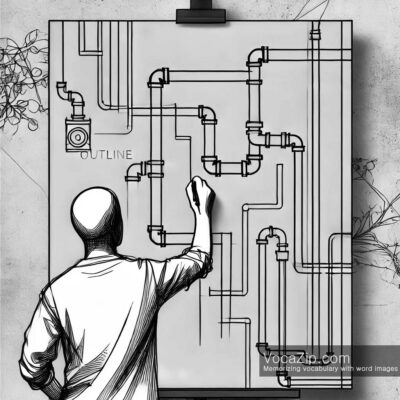outline meaning
outline :
summary, main points
noun
▪ The teacher gave an outline of the lesson.
▪ The teacher gave a summary of the lesson.
▪ Please read the outline before the meeting.
▪ Please read the main points before the meeting.
paraphrasing
▪ summary – brief overview
▪ plan – main points
▪ sketch – rough drawing
▪ framework – basic structure

outline :
to summarize, to give main points
verb
▪ She outlined the project plan.
▪ She summarized the project plan.
▪ The manager outlined the steps to take.
▪ The manager gave the main points of the steps to take.
paraphrasing
▪ summarize – to give a brief overview
▪ draft – to create a basic version
▪ sketch – to draw roughly
▪ plan – to arrange in advance
Pronunciation
outline [ˈaʊtˌlaɪn]
The stress is on 'out' and sounds like 'out-line'.
Common phrases and grammar about outline
outline - Common meaning
noun
summary, main points
verb
to summarize, to give main points
Part of Speech Changes for "outline"
▪ outlined (adjective) – summarized or with main points given
▪ outlining (noun) – the act of summarizing or giving main points
Common Expressions with "outline"
▪ detailed outline – a thorough summary
▪ outline a plan – to summarize a plan
▪ outline a proposal – to give main points of a proposal
▪ outline requirements – to summarize needs
Important examples of outline in TOEIC
Vocabulary examples from the TOEIC test
In TOEIC vocabulary questions, outline is often used to mean a summary of a plan or proposal.
Example of a confusing word: outline (to draw the outer edge)
Grammar examples from the TOEIC test
In TOEIC grammar questions, outline is used as both a noun and a verb, and questions ask to differentiate them.
outline
Idioms and fixed expressions in TOEIC
outline of a report
'summary of a report', used in business contexts.
outline of a book
'summary of a book', used in academic contexts.
Differences between similar words and outline
outline
,
summary
differences
Outline is used to give main points, while summary is a brief statement of the main points.
outline
,
draft
differences
Outline is used to give main points, while draft is a preliminary version of a document.
Words with the same origin as outline
The origin of outline
outline comes from the Middle English 'outlīne', which first meant the outer line of a shape and then came to mean a summary.
Word structure
It has the prefix out (external), root line (a mark or boundary), and means 'external boundary'.
Words with the same origin
The word's root is unclear or difficult to confirm.
Please select an image in the quiz
Previous post and next post







